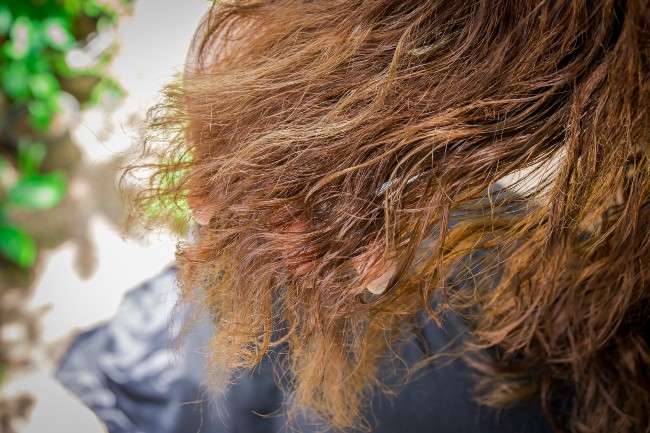
- Chlorine actually removes moisture from the hair. And when that happens, the hair shrinks, causing it to become curlier. Frizz also appears, which will give your hair a curlier appearance.
- This effect isn’t permanent and can occur on both virgin and chemically treated hair, e.g., bleached or dyed hair.
- To prevent chlorine from making your hair curlier, it’s a good idea to protect it with a swimming cap.
- If you don’t want to wear a cap, rinse your hair with tap water every time you finish swimming and incorporate extra moisturizing shampoos and conditioners into your hair care routine.
YOU MAY ALSO BE INTERESTED IN: Can I swim in the pool or the ocean if I’ve gotten a perm?
How nice it is to swim and feel like a mermaid in the sea and pool!
But you can’t forget one important thing: chlorine dries out your hair. When chlorine dries out your hair, the appearance of your hair can change radically, becoming curlier.
How?
- After swimming for two or three hours in the pool, you’ll notice your hair is frizzy. At first, it will be a few hairs that stick out. And if you swim for two or three days in a row, by the end, it will look like you stuck your fingers in a socket because your hair will be frizzy.
- Plus, as if the frizziness wasn’t enough, you’ll also notice your hair getting curly.

YOU MAY ALSO ENJOY: Products to protect hair from the swimming pool chlorine
The truth is chlorinated water is one of your hair’s worst enemies. Because if your hair is colored, chlorine will fade the color faster. And if your hair is blonde, it will even turn greenish.
And chlorine will be to blame for this transformation of your hair. Why?
I’ll tell you about it below, although I’ll warn you that we won’t find proof of chlorine’s innocence.
Why chlorine makes hair frizzier
A few moments ago, I gave you some hints about the explanation. Chlorine dries out the hair, making it curlier.
But to understand how chlorine acts on the hair, we need to talk about hair’s composition.
Each strand of your hair has three sections:
- The outer part or cuticles , which are small scales that protect the middle and inner parts.
- The middle part or hair fiber , which is covered by the cuticles. It absorbs nutrients, moisture, and dye color if you dye your hair.
- The inner part or core , where the color is housed, and nutrients are produced that feed the middle and outer parts.

When you swim in the pool, the chlorine and salt in the water open the hair cuticles, removing nutrients and moisture from your hair.
When you finish swimming and your hair dries out, it shrinks and goes curly.Why?
Because your hair, which retains the chemicals from chlorinated water, is drier and frizzier. And this will happen regardless of whether your hair is straight or curly. The chlorine will give it a curly appearance.
And if you color or bleach your hair, you won’t escape the frizz from the chlorine either. Because chemically treated hair is more porous, as the chemical processes break down the hair cuticles.
So , if your hair is colored or bleached, it will absorb the chlorine chemicals faster, making it curlier.
YOU MAY ALSO LIKE TO READ: How to protect your hair when swimming every day? 4 foolproof hacks every swimmer should know
How to prevent chlorine from making your hair go curlier

Well, here we get into a tricky subject.
Because if you want to completely prevent chlorine from making your hair curlier , you should swim wearing a silicone swimming cap, which is the material that offers the best waterproofing.
I understand that swimming with a cap isn’t glamorous, and may even be uncomfortable if you have long hair.
But it’s your best option if you can’t stand the chlorine making your hair curly.
If you don’t want to protect your hair with a swimming cap, you’ll need to pay more attention to your hair when you’re done swimming.
- First, both before and after swimming, rinse your hair with tap water. Wetting your hair with tap water before swimming will make your hair absorb water and have less room to absorb chlorine chemicals. Rinsing your hair with tap water after swimming will wash away a good portion of the chlorine.
- Incorporate extra moisturizing shampoo and conditioner into your hair care routine. Use those containing keratin or oils such as coconut or argan oil.
- Apply a hair mask once a week.
If you follow this hair care routine, chlorine will less likely make your hair go curly.
Conclusion
Chlorine from the pool makes your hair curly because it takes away moisture and nutrients from your hair. If you don’t want your hair to go curly after swimming, your best option is to use a silicone swimming cap.







